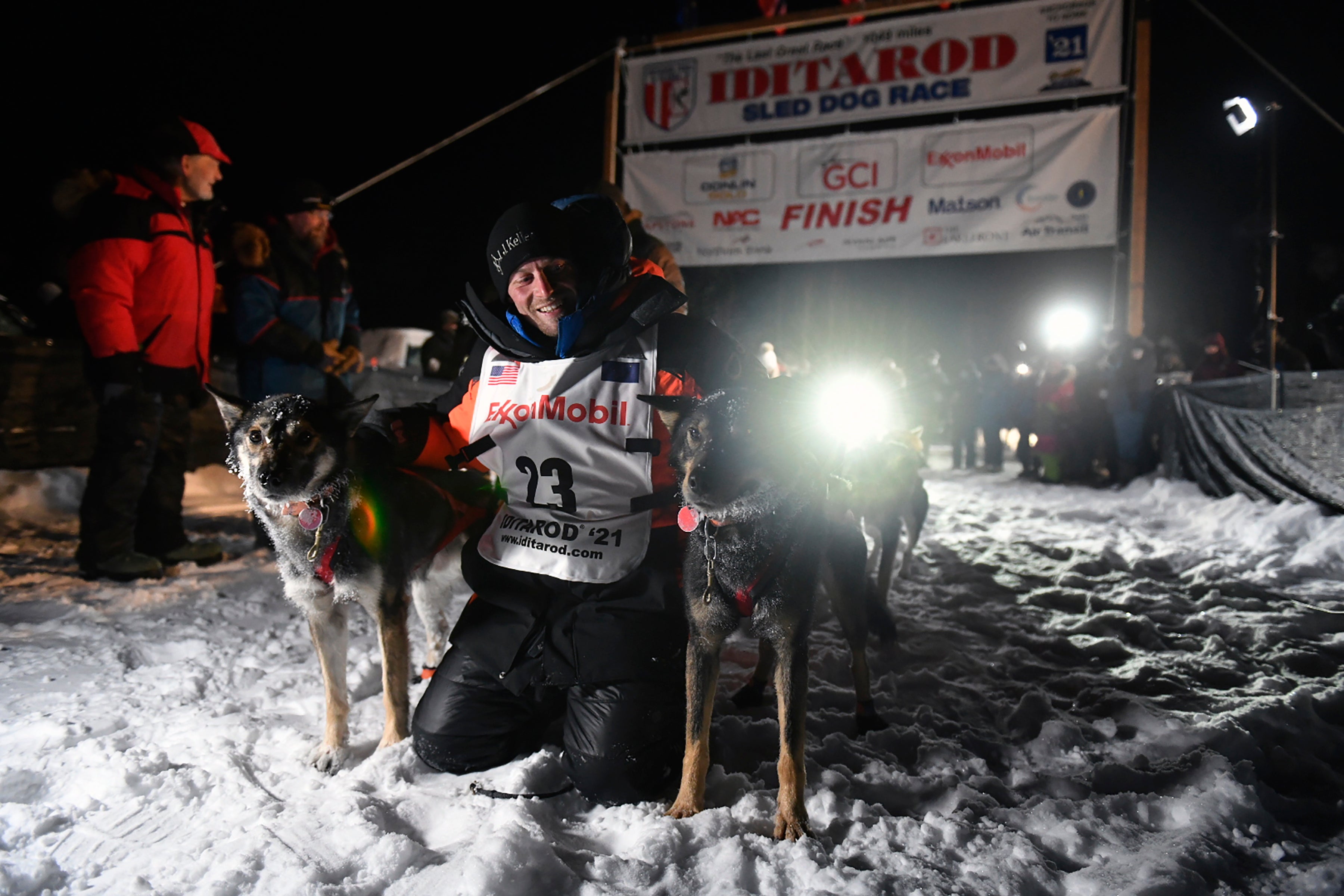Dallas Seavey wins Iditarod, matches most wins by a musher
Dallas Seavey has won the Iditarod and matched a milestone in the world's most famous sled dog race

Dallas Seavey on Monday won the pandemic-shortened Iditarod Trail Sled Dog Race, matching the most wins ever by a musher.
Seavey brought his 10 dogs across the finish line near the community of Willow, Alaska, with a healthy lead over the second place musher, Aaron Burmeister.
It was the fifth title for the 34-year-old Seavey. He matched the five-win threshold that only one other musher has accomplished. Rick Swenson won his five titles between 1977 and 1991.
“It's a big deal,” Seavey said at the finish line after a race official checked to make sure his sled was complete with a sleeping bag, axe, dog booties and other mandatory gear. His finish was televised statewide.
Seavey said he didn't allow himself to think about a fifth win while on the trail because he didn't want to jinx it.
“That’s huge, man,” he said. "I looked up to the Iditarod champions my whole life and I’ve dreamed about this my whole life. And now to actually go from that, to see it happen, to realize that, that’s pretty cool.”
Seavey said he tries to give himself a little time after each win to revel in it, but then it's time to focus on the next thing, whatever it is.
“Whatever you’re doing, give it your whole attention and we’ll dwell on the records or the numbers when we’re too old to keep doing it. That’s the time to look back at it," he said. "But right now, I want to keep moving.”
It’s also a triumphant return for Seavey. At age 34, many believe he could one day become the Iditarod’s greatest champion. His official winning time was 7 days, 14 hours, 8 minutes and 57 seconds.
Seavey previously won four titles in a five-year span, starting in 2012. He last raced in 2017 after Iditarod officials said four of his dogs tested positive for a banned opioid painkiller.
At the time, he vehemently denied giving his dogs any painkillers. A year later, the Iditarod reversed course and cleared Seavey of any wrongdoing.
But he sat out the race until this year, choosing to compete with his dogs in Europe instead.
This year’s Iditarod had a route change and was shortened to about 850 miles (1,368 kilometers) because of the pandemic.
The Iditarod began March 7 with 46 mushers who bypassed most rural Alaska villages that normally serve as checkpoints as a COVID-19 safety precaution, leaving the competitors to sleep in tent camps outside towns or under the stars in temperatures that have reached minus 55 degrees (minus 48 C).
Since then, nine have scratched including fan favorite Aliy Zirkle, who was injured in a fall in what she has said would be her last race. Another musher, Gunnar Johnson, was withdrawn after he tested for positive for COVID-19, leaving 36 teams in the race.
Mushers started the race near Willow, about 50 miles (80 kilometers) north of Anchorage From there, they traveled to the ghost town of Iditarod and then turned back around to finish in Willow.
A normal race is about 1,000 miles (1,609-kilometer), and takes mushers across the wilds of Alaska from Willow to the finish line in Nome, on the state’s Bering Sea coast.
Seavey won just over $40,000 and a snowmobile for winning the world's premiere sled dog event, down about $10,000 from what last year's winner, Thomas Waerner of Norway pocketed. Warner also won a new pickup.
The overall purse was decreased by 20%, to $400,000, hurt by the loss of big name sponsors like Chrysler through an Anchorage dealership and Alaska Airlines.
The animal rights group People for the Ethical Treatment of Animals takes credit for sponsors dropping the race after the group staged protests outside corporate headquarters.
Another PETA target, ExxonMobil, also announced that this year's Iditarod would be the last race it sponsors.
The Iditarod took other financial hits this year. Because of the pandemic, fundraisers have been canceled, and organizers spent thousands of dollars on personal protective equipment and COVID-19 tests. They also reduced the musher entry fee in half.
Bookmark popover
Removed from bookmarks